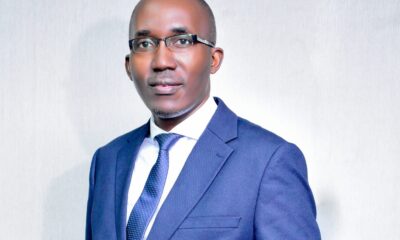Columnists
Uganda’s economy; the ‘true’ genesis of the on-going economic malaise; Part I
Uganda has always been a country of euphemism. When I was little, I encountered a moment that struck my innocent but curious mind. My mother had been ill for a few days. At times the illness degenerated into some painful moans deep in the night.
One morning, one of her close friends came to check on her. When she inquired how mum was doing, she responded, “I am alright.” I nearly interjected their conversation with a quick, “she is lying”, but I weighed the consequences of exposing her ‘dishonesty’ against my silence, and quickly realised the latter was a better option.
From that day I’ve grown up wondering why Ugandans love to cover up, yet we are not that good at minding our own business. For instance, save for a few outliers like my good friend and teacher, Dr. Fred Muhumuza, I am perturbed why economists in this country chose to hide their heads in the sand as the economy slid into recession.
Relatedly, I cannot stop wondering why senior journalists have turned themselves into public relations counsellors, wrapping plain facts in cloudy camouflage. Why have we fallen into the politicians’ trap, understating clear “recession” as “downturn” or “slowdown”?
Hiding behind semantics
A few years ago, we chose to accept sheer ‘rosy scenarios’ as facts when bureaucrats and politicians referred to natural growth as “robust,” “resilient” or “sustained growth”.
In June 2013, while reading the 2013/14 budget, then Finance Minister Maria Kiwanuka said, “Madam Speaker, over the last year the Ugandan economy has proved RESILIENT and demonstrated STRONG signs of growth” [see page 5 of 2013/14 budget speech].
At our post-budget debate at Makerere University Business School (MUBS), I questioned the “resilience” and the “strong signs of growth.” At the time, the economy was reported to be growing at 4.5%, itself a clear contrast with the ‘on the ground realities’ prevailing then.
The following year, the Minister realised that things were not as rosy as she had portrayed them in her previous budget. She looked for a way out without losing her buzzwords. She said, “…our demand for Imports of goods and services remained ROBUST” [see page 8 of 2014/15 budget speech]. Imagine! Celebrating rising demand for imports!
When Maria left, his successor Matia Kasaija picked from where she had stopped, painting pictures of elephants to denote squirrels. While reading his first budget, Kasaija said, “Madam Speaker, our economy is projected to grow by 5.3% in real terms this financial year (2015/16), reflecting almost full recovery from the slowdown that happened in financial year 2012/13” [see page 6 of 2015/16 budget speech].
Finance finally conceded!
Critiquing his budget speech at our MUBS Economic Forum, live on 93.3 KFM as he read it, we questioned the veracity of Kasaija’s figures (5.3% growth!) and the basis for his belief that the economy had fully recovered. We knew the authors of the budget were politicking ahead of the 2016 general elections.
Last year, Kasaija told the country how the economy had actually grown at 4.6% in 2015/16, nearly a percentage point below the projected growth rate, but still went ahead to add their favourite buzzwords thus, “Madam Speaker, Uganda’s economy has remained RESILIENT amidst a volatile global environment…supported by ROBUST growth in the services and construction activities” [see page 2 of 2016/17 budget speech].
Last October, the old man walked to parliament and said, “…the economy is struggling…but has remained RESILIENT despite several unfavourable conditions.” In short, in recent past, the worst that could possibly happen to Uganda’s economy were “slowdowns” or “struggles.”
Not anymore. Last week, the IMF issued a report that the hitherto “robust” and “strong” economy was expected to grow at about 3.5% in 2016/17, more than a percentage point lower than its earlier projected growth rate.
At the same press conference, for the first time a Finance Minister, not Kasaija but his deputy David Bahati, conceded that the economy was weak. How I wish the guys at Finance and Bank of Uganda (BOU) did not wait for the patient to degenerate into ICU (intensive care unit) material.
I think had they revealed the true ailment of the patient to its ‘owners’, we wouldn’t have gone for paracetamol to treat cancer. For years, I have written my pens empty, talked my voice hoarse, and driven to the furthest points of this country trying to bring it to the attention of whoever cared to listen to me why the economy was headed to the worst, and how we could reverse the trend.
The genesis
So what’s the disease that is afflicting all this pain to Uganda’s economy, and its genesis? First, the economic policies upon which Uganda’s economy is anchored are faulty, uncoordinated and need urgent second-generation reforms.
In November 2011, I wrote in these very pages asking, “Government or Bank of Uganda; who to blame for worsening economic situation?” In this piece, I warned how the underground battle between the “monetarists” at BOU and the “Keynesians” at Ministry of Finance was undermining the effectiveness of Uganda’s economic policies.
In between, I wrote a number of articles that culminated into the one I penned in December 2012, entitled; “Why banks won’t reduce lending rates”. This piece questioned the BOU’s logic of reducing inflation mechanically.
I wrote this at the time when the BOU was struggling to influence banks to reduce lending rates that at the time were as high as 30%. This was on account of BOU’s decision to raise the central bank rate (CBR) quite wildly from its pre-crisis rate of 14% to 23% in eight months.
I wondered why Emmanuel Tumusiime-Mutebile’s team at the BOU was acting as if price stability was independent of other structural conditions in the economy. I knew that these very well-educated and smart economists were looking for quick-fix solutions to high inflation without thinking about their long run effects to the economy’s performance.
Needless to say, since Mutebile and his colleagues knew that, just like prices in goods markets, interest rates are sticky downward, they should have thought twice before raising interest rates at lunatic speed just because they wanted to mechanically reduce inflation. I promised them to wait for the results. And they are out!
No economy can work without affordable capital that the economic agents can use to finance start-ups, expand businesses, or raise aggregate demand. I have said it before and I will repeat it, no sane person can borrow at above 20% per annum, invest in a ‘normal’ business, repay the debt, and stay in business. Until the leadership of this country and the monetarists at BOU realise this, we shall continue to rely on good luck and God for economic prosperity.
Political uncertainty
Secondly, Uganda’s economy is being boggled down by political uncertainty. In another piece four years ago, I warned, thus, “Economy won’t recover under this uncertainty.”
Mr. President, like I wrote here four years ago, although Ugandans loved you so very much, justifiably because you have dedicated a greater part of your life struggling to better their lives, you risk wasting away everything you had achieved due to your failure to show us that you are different from other selfish leaders who led this country before.
The uncertain trajectory started in 2005 during the bisanja (presidential term limit) debate. Right now, a related debate is up in the air: will the President accept and facilitate the removal of the age limit clause? Trust me, debates of this kind are more of growth retarding than progressive.
I understand that lately you are more interested in discussing wealth creation and economic prosperity. Unfortunately, no economy can prosper in the midst of political uncertainty.
We know that political unrest breeds economic unrest. The reason our economy collapsed in the 1970s and ’80s was not because Obote and other leaders could not make good plans. No. It collapsed because the politics had failed and the leaders failed to fix it.
I know the authorities at Finance and the BOU often cite factors such as slow growth in China, fall in commodity prices, tight financing conditions mainly in Europe, and geo-political events such as Brexit and U.S politics, as well as regional and domestic factors, notably South Sudan crisis and drought conditions, as the main causes of the poor economic performance we are facing.
Well, my considered view is that although those factors have contributed to the crisis, political uncertainty and faulty economic policies carry more weight. Indeed when we look around the region, it is only countries that are in situations similar to ours (such as South Sudan, Burundi and partly Kenya) whose economies are equally struggling.
On the other hand countries such as Ethiopia, Tanzania and Rwanda are growing at higher rates, respectively at 9.6%, 7% and 6.9% per annum. If I may ask our policymakers who love to overplay the global phenomena in explaining our economic woes, why haven’t those factors affected the three neighbours of ours above?
Mr. President, next week I will continue explaining why our economy is retarded and how we can fix it. There is no way you can have an economy where a single sector (that contributes less than a quarter of the annual value of total output) employs three quarters of the population, and expect anything different from what we are witnessing today. We are paying the price of attempting to evade the dictates of structural change. I will be back next week.
Comments






















